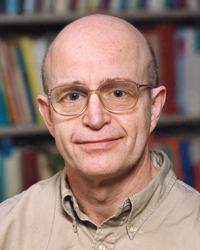Carnegie Mellon's John R. Anderson To Attend White House Workshop on Bridging Neuroscience and Learning
By Shilo Rea / 412-268-6094
 At the invitation of the White House Office of Science and Technology Policy, Carnegie Mellon University's John R. Anderson will participate in the White House Workshop on Bridging Neuroscience and Learning on Friday, Jan. 23 in Washington, D.C.
At the invitation of the White House Office of Science and Technology Policy, Carnegie Mellon University's John R. Anderson will participate in the White House Workshop on Bridging Neuroscience and Learning on Friday, Jan. 23 in Washington, D.C.
The workshop's goals are to identify research gaps and innovations in research methodology and data analysis, and to generate ideas for effectively disseminating information to the broader public, such as individuals and schools. Anderson, whose human thought and cognition research has revolutionized how we learn, is one of 28 experts in neuroscience, cognitive science, developmental psychology and other relevant disciplines who will participate in the workshop.
A member of the CMU faculty since 1978, Anderson, the R.K. Mellon University Professor of Psychology and Computer Science, is renowned for his work that combines cognitive psychology and computer science to understand how the brain works, how people learn and how computer-based instructional systems can be used as educational aids.
In the 1990s, Anderson led a team that created an intelligent computer tutor to teach algebra to high school students. The program actually thought like a teenager and was so successful that a spinoff company, Carnegie Learning, developed computer tutors as a commercial product. To date, more than half a million students in 2,600 schools around the U.S. have used the tutoring software.
Another notable example of Anderson's impact is the Pittsburgh Science of Learning Center (PSLC), a joint program of Carnegie Mellon and the University of Pittsburgh. The center, which will receive almost $50 million in grant support from the National Science Foundation, uses tutoring software to develop effective new means of teaching and to gather valuable information about the learning process from students in actual classrooms, not laboratory environments.
In 2011, Anderson was named a Franklin Institute Laureate and was awarded the Benjamin Franklin Medal in Computer and Cognitive Science "for the development of the first large-scale computational theory of the process by which humans perceive, learn and reason, and its application to computer tutoring systems." Previous honorees of the Franklin Institute's prestigious awards include Albert Einstein, Thomas Edison, Frank Lloyd Wright and Allen Newell, the late CMU professor and one of Anderson's mentors.
Anderson's legacy of work is one example of how Carnegie Mellon has been a longtime leader in the study of brain and behavior. As the birthplace of artificial intelligence and cognitive psychology, Carnegie Mellon has created the first cognitive tutors, helped to develop the Jeopardy-winning Watson, founded a groundbreaking doctoral program in neural computation, and completed cutting-edge work in understanding the genetics of autism. Building on its strengths in biology, computer science, psychology, statistics and engineering, CMU recently launched BrainHubSM, a global initiative that focuses on how the structure and activity of the brain give rise to complex behaviors.
Anderson’s pioneering work at the crossroads of machine and human learning is the foundation of CMU’s Simon Initiative. Named for the late CMU Nobel Laureate professor and co-founder of artificial intelligence, Herbert Simon, this initiative harnesses a cross-disciplinary ecosystem of learning science that has developed over several decades at CMU, with the goal of measurably improving student learning outcomes.
The White House Workshop on Neuroscience and Learning is an activity of the Interagency Working Group on Neuroscience, a subcommittee of the National Science and Technology Council's Committee on Science. The National Institutes of Health (NIH), the National Science Foundation (NSF), and the U.S. Department of Education's Institute of Education Sciences (IES) are jointly planning the workshop.
For more information on Anderson, visit http://www.psy.cmu.edu/people/anderson.html.
###
John Anderson (pictured above) is renowned for his work that combines cognitive psychology and computer science to understand how the brain works, how people learn and how computer-based instructional systems can be used as educational aids.